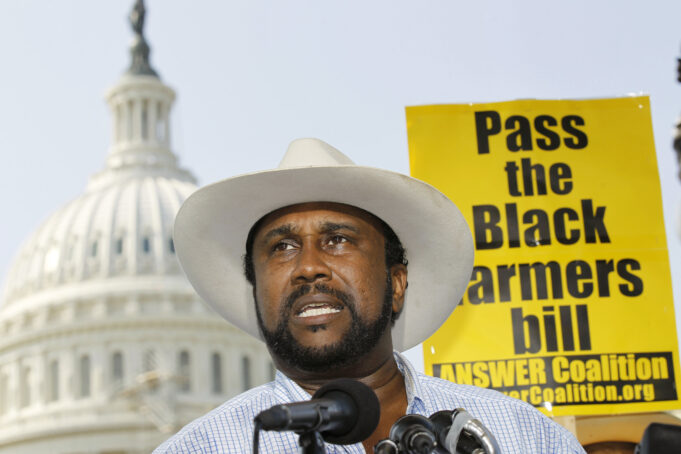Black farmers throughout the country are continuing their fight for remedies against what they call an ongoing climate of racism and indifference within the U.S. Department of Agriculture, 23 years after settling a federal class action lawsuit alleging discrimination in the allocation of farm loans, subsidies and other vital assistance.
Originally filed in 1997 against then-Secretary of Agriculture Dan Glickman, plaintiffs Timothy Pigford, and at least 400 others alleging years of discriminatory treatment, settled under a consent decree after organizing their efforts and speaking with one voice.
“We’ve been around since the early ’80s and we were formed because Black farmers weren’t getting a lot of support from the Civil Rights community,” said John Boyd, founder and president of the National Black Farmers Association (NBFA) while recounting multiple instances of blatant racism experienced by their members in Virginia, including being called the N-word, “boy,” and even having tobacco juice spat upon them by a county official responsible for dispensing USDA funds.
Unfortunately, the settlement didn’t resolve all issues and even under Biden-appointed Secretary of Agriculture Thomas J. Vilsack—who held the same post under the Obama administration—Black farmers are still encountering roadblocks to fair treatment afforded their White counterparts.
Broken promises
In January 2021, USDA guaranteed it would suspend foreclosures, debt collections, and other adverse actions on borrowers with direct farm loans, made between the Farm Service Agency and the borrower, given the economic hardship posed by the Covid-19 pandemic, noted April Simpson, a reporter for The Center for Public Integrity in an article titled, “Promised debt relief, some Black farmers get collection notices.” The relief did not happen.

Black farmers then got their hopes up when the Biden administration announced that they would receive $4 billion in loan forgiveness funds allocated as part of the $1.9 trillion Covid-19 pandemic American Rescue Plan. However, those hopes were short lived. White farmers retaliated.
Legal challenges from White farmers claiming reverse discrimination were filed in several states. Eventually a federal judge stopped USDA from implementing the program and allowed a class action lawsuit to proceed. The lawsuit represents 12 farmers from Wisconsin, Minnesota, South Dakota, Missouri, Iowa, Arkansas, Oregon and Kentucky protesting the American Rescue Plan Act of 2021.
“White farmers sued us in 12 different courts in twelve different complaints,” Mr. Boyd. “In two of those cases filed by White farmers in Texas and Florida, they issued a temporary injunction blocking the debt relief of $4 billion for 14,000 plus farmers of color that included Native Americans, Hispanics and Asians,” he said.
“If you were trying to participate in government programs, you had to destroy your crops for Covid,” Mr. Boyd said while noting the additional difficulties facing Black farmers over the last two years of the global pandemic.
Black Americans once owned about 14 million acres of farmland between the late 1800s and early 1900s. Today Blacks own less than two million acres of land and, according to other advocacy groups, the failure of the USDA to address injustices and other harms is forcing undue hardships upon the last of the country’s Black-owned family farms.
“We would like to acknowledge that this is the first time in history where we have had two African American U.S. Senators serving on the Senate Agriculture Committee,” stated Eddie Slaughter, executive director of the Georgia-based African American Agriculturalist Association, in a February letter to Senator Raphael Warnock (D-Ga.).

“We need for you to understand that all African American farmers are looking to you and Senator Cory Booker (D-NJ) for leadership and support. You also need to understand that you represent all African American farmers in the United States who continue to suffer under U.S. Department of Agriculture (USDA) institutional discrimination, not just farmers in Georgia,” the letter insisted.
Mr. Slaughter told The Final Call he appreciated Sen. Warnock’s December 10 letter to Sec. Vilsack on behalf of Black farmers, but he also expressed outrage over the secretary’s alleged failure to provide a written response to the senator’s time-sensitive congressional inquiry relating to portions of 2021 federal legislation addressing relief for those continuing to suffer institutional discrimination.
“There is $750M designated in Section 1006 in the American Rescue Plan Act for farmers of color,” Mr. Slaughter’s letter said on behalf Black farmers fearful of losing their land because of tax liabilities and debts. “Section 1006 provides funding for technical assistance and outreach through community-based organizations and 1890 land grant institutions as well as direct payments to farmers who have suffered past discrimination,” his letter to Sen. Warnock said.
Adding that President Biden’s pledge to investigate wrong-doing regarding misuse of American Rescue Plan Act funds during his State of the Union address on March 1, Mr. Slaughter said Black farmers stand to lose an additional million acres of land if they are denied justice once again. He further stated that double standards in the disbursement of agricultural related monies exemplifies cronyism if not fraud, waste and abuse.
“When this money comes down, the county committee reports to USDA Farm Service Agency about who they will and who they will not let own land, that’s what they’re about, and if they don’t want you to own it, you won’t get it,” Mr. Slaughter said to The Final Call. He is also calling for Sec. Vilsack’s resignation.
“The thing about this is that when you have a secretary of agriculture with the track record that he (Vilsack) has, when he allows those things to occur, there’s no one to hold his feet to the fire and say this is wrong, this is discrimination, this is against the law,” he continued.
“He’s given out a lot of money to Black organizations, but none of it will help Black famers. It may look like he’s doing something to help us, but he ain’t,” Mr. Slaughter said. “He doesn’t care and refuses to pay the Black farmers even though the money is there, and that’s why he has to go.”
Unity, innovation and separation
Stating that the ownership of producing land is key to independence and that elements of survival include control over producing one’s own food, clothing and shelter, Dr. Ridgley Abdul Mu’min Muhammad, the Nation of Islam Student Minister of Agriculture and manager of Muhammad Farms in Southwest Georgia, said that failure to produce and service one’s own needs breeds dependence on those in power and a vulnerability detrimental to a people’s future.
“The U.S. Department of Agriculture did what they called a ‘parity ratio’ that started in 1910, and I had no idea what it was about until studying what was going on historically with the Black farmers,” Dr. Muhammad said of the 1-to-1 ratio that subsistence farming created as Blacks acquired more land into the early 20th century.
“Then, (USDA) later developed the county committee and the subsidy programs that they controlled, to funnel money to the White farmers, and to subsidize their product when the price they were getting in the market was not enough, and they didn’t give that to Black farmers,” he added.
Adding that it is unrealistic to expect meaningful changes out of deeply embedded policies and agendas originally designed to relegate Black farmers to the margins of society, Dr. Muhammad argued that Black survival is at stake. He also argued that new and innovative ideas are vitally necessary if both Black family farms and communities are to survive into the 21st century.
“So, this was a military move,” Dr. Muhammad argued. “You economically squeeze the Black farmers out by giving White farmers money underneath the table, and in giving the White farmers in those local counties control over the money, they can buy the Black farmers out because they cannot make a living.”













